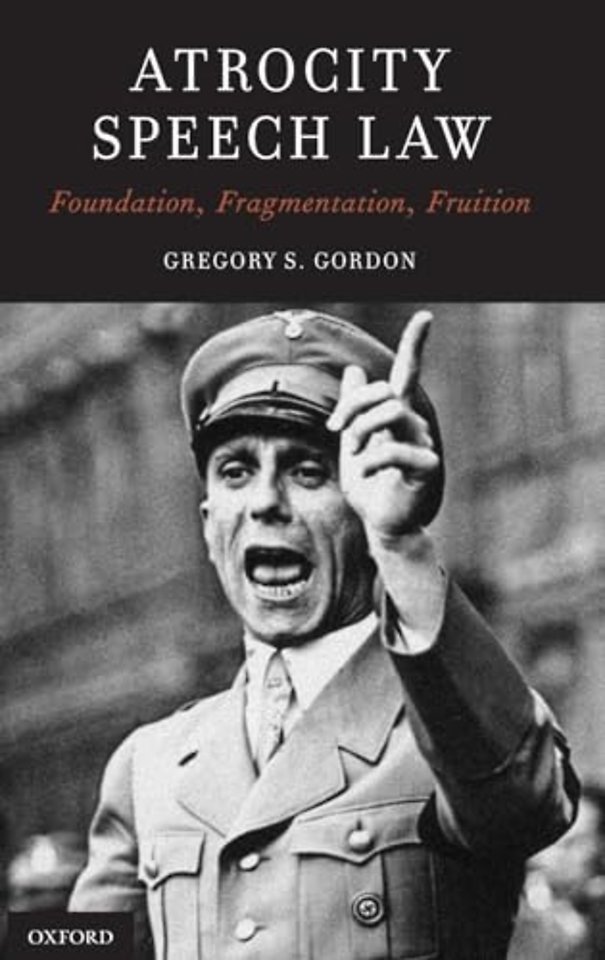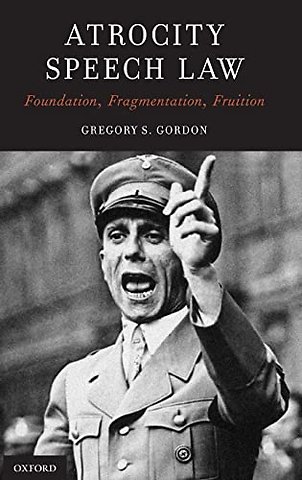



Professor Gregory S. Gordon is Associate Dean for Development/External Affairs, and Director of the Research Postgraduates Program at The Chinese University of Hong Kong Faculty of Law.
Meer over Gregory GordonAtrocity Speech Law
Foundation, Fragmentation, Fruition
Samenvatting
The law governing the relationship between speech and core international crimes — a key component in atrocity prevention — is broken. Incitement to genocide has not been adequately defined. The law on hate speech as persecution is split between the International Criminal Tribunal for Rwanda (ICTR) and the International Criminal Tribunal for the former Yugoslavia (ICTY). Instigation is confused with incitement and ordering's scope is too circumscribed. At the same time, each of these modalities does not function properly in relation to the others, yielding a misshapen body of law riddled with gaps. Existing scholarship has suggested discrete fixes to individual parts, but no work has stepped back and considered holistic solutions.
This book does. To understand how the law became so fragmented, it returns to its roots to explain how it was formulated. From there, it proposes a set of nostrums to deal with the individual deficiencies. Its analysis then culminates in a more comprehensive proposal: a Unified Liability Theory, which would systematically link the core crimes of genocide, crimes against humanity, and war crimes with the four illicit speech modalities.
The latter would be placed in one statutory provision criminalizing the following types of speech: (1) incitement (speech seeking but not resulting in atrocity); (2) speech abetting (non-catalytic speech synchronous with atrocity commission); (3) instigation (speech seeking and resulting in atrocity); and (4) ordering (instigation/incitement within a superior-subordinate relationship). Apart from its fragmentation, this body of law lacks a proper name as Incitement Law or International Hate Speech Law, labels often used, fail to capture its breadth or relationship to mass violence. So this book proposes a new and fitting appellation: atrocity speech law.
Specificaties
Inhoudsopgave
Preface
Introduction
Part I: Foundation
Chapter 1: Speech and Atrocity: An Historical Sketch
Chapter 2: International Human Rights Law and Domestic Law
Chapter 3: The Birth of Atrocity Speech Law:
Nuremberg and the Foundational Statutes
Chapter 4: The Birth of Atrocity Speech Law:
The Foundational Ad Hoc Tribunal Cases and Offense Elements
PART II: FRAGMENTATION
Chapter 5: Problems regarding the Crime of
Direct and Public Incitement to Commit Genocide
Chapter 6: Problems regarding Persecution, Instigation and Ordering
Chapter 7: The Absence of Criminal Prohibitions
Regarding Hate Speech and War Crimes
PART III: FRUITION
Chapter 8: Fixing Incitement to Genocide
Chapter 9: Fixing Persecution, Instigation and Ordering
Chapter 10: Adopting Incitement to Commit War Crimes
Chapter 11: Restructuring: A Unified Liability Theory for Atrocity Speech Law
Conclusion
Index
Anderen die dit boek kochten, kochten ook
Net verschenen
Rubrieken
- aanbestedingsrecht
- aansprakelijkheids- en verzekeringsrecht
- accountancy
- algemeen juridisch
- arbeidsrecht
- bank- en effectenrecht
- bestuursrecht
- bouwrecht
- burgerlijk recht en procesrecht
- europees-internationaal recht
- fiscaal recht
- gezondheidsrecht
- insolventierecht
- intellectuele eigendom en ict-recht
- management
- mens en maatschappij
- milieu- en omgevingsrecht
- notarieel recht
- ondernemingsrecht
- pensioenrecht
- personen- en familierecht
- sociale zekerheidsrecht
- staatsrecht
- strafrecht en criminologie
- vastgoed- en huurrecht
- vreemdelingenrecht





